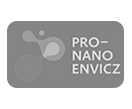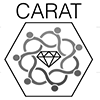Photoelectrochemical reduction of carbon dioxide on copper foam electrodes modified by copper oxides
Gradual increase of carbon dioxide concentration in the atmosphere poses a significant threat for future generations. Strategies to reverse the accumulation of carbon dioxide include its photoelectrochemical reduction, generating organic molecules to be potentially used as a form of sustainable energy. However, the photoelectrochemical reduction of carbon dioxide, which typically takes place at planar photocathodes made of materials such as copper oxides, suffers from a low quantum yield. To overcome this limitation, this project is aimed at utilizing nanoarchitectures of copper foams instead of planar electrodes. The modification of copper foams by copper(I) oxide/copper(II) oxide composites will be carried out, forming photocathodes with a huge surface-to-volume ratio. This will allow carbon dioxide to be photoreduced with considerably higher efficiency. Formed reaction intermediates and products will be detected and quantified by on-line analytical tools - IR spectroelectrochemistry, selected ion flow tube mass spectrometry and gas chromatography mass spectrometry.
RNDr. Kolivoška Viliam Ph.D., MBA
 jh-inst.cas.cz
jh-inst.cas.cz

















